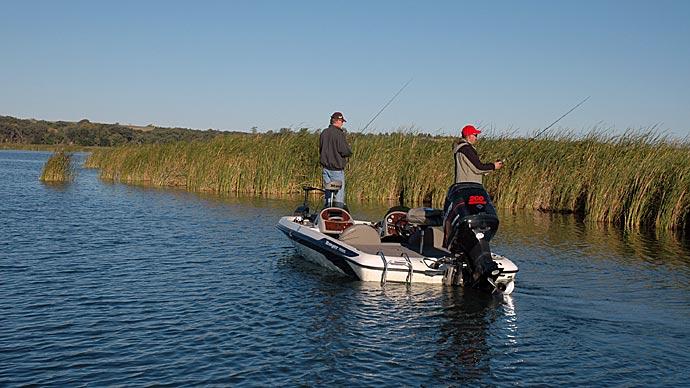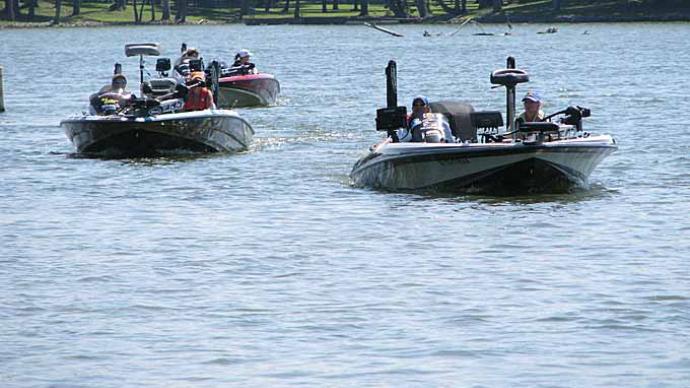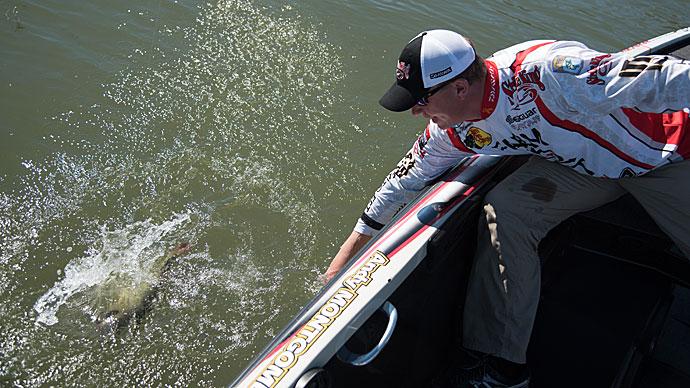Editor's Note: While this article was written decades ago, and the names of the tournament circuits have changed, the same principles and concepts hold true today. Read on for some valuable advice!
| Where to Start |
|
For the beginner, a pro-am tournament trail is the place to be. The rules of the circuit help beginning anglers learn more about the sport. Each tournament features a Co-Angler Division that allows new anglers to learn without the expense of owning a boat or the stress of operating another person's boat. The entry fee for co-anglers is less than the boaters, who are entitled to larger payouts. You can start as a co-angler and move up to the Boater Division as your confidence builds. Remember that it takes years planning and training before you are ready to move to the next level, like the EverStart Series. And professional angling is not for everybody. It is hard work. Anglers spend long hours on the road and hard days on the water. After the tournament day, professional anglers must run the business of marketing themselves, conducting seminars, and working for sponsors. If you've already had success on a pro-am Tournament Trail, have the skills to compete on and off the water, and are ready to commit to a career change. It may be time to move to the EverStart Series or the FLW Tour. Many anglers, like Walker and Bolton, made similar moves with great success.
|
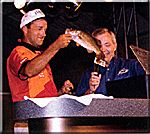
Years ago, a young Michigan angler took an interest in tournament bass fishing. He entered his first local fishing contest using a small aluminum boat with tiller steering and a 15-horsepower outboard motor.
While the boat and motor were small by today's standards, that tin boat launched the professional bass fishing career of one of today's hottest FLW Tour stars - David Walker of Cannon, Kentucky.
"I had no idea what I was doing. I fished the tournament and did terrible," Walker recalls. "But I liked it, and I said, 'I'm going to figure out how to do that.'"
Walker joined a local bass club as a non-boater to learn more about the sport. Like most avid bass anglers, he had visions of grandeur and dreamed about fishing full-time on the professional circuit. As his fishing skills developed, his vision turned into a well-focused objective.
Michigan was a great place to learn about bass fishing, but nearly all the lakes are small natural lakes. To compete professionally, Walker knew he needed to broaden his knowledge. To gain more experience fishing large reservoirs, he moved to Kentucky in 1990. Immediately, he joined a local bass club.
"If you want to learn about fishing, you must fish with the best," Walker says. So he researched the local clubs and joined the club with the most competitive anglers. Again, Walker fished as a non-boater. He learned quickly and eventually took the club's Angler of the Year title. Walker knew it was time to move on.
The Red Man Tournament Trail was the most logical choice. Walker proved he could handle tough competition by twice finishing as his division's points leader. In 1996, he tried the Wal-Mart FLW Tour, fishing the circuit part-time.
Walker made the ultimate tournament angler's decision just before the 1999 season. He started a full-time professional angling career and entered all FLW Tour events.
"I always wanted to do it, and I knew what it would take," Walker says. "I kept thinking I had to have a major win before I could quit my job. That didn't happen. But I quit my job anyway."
Walker made the right decision. He went on to win the 1999 FLW Tour Angler of the Year title and was immortalized on the Wheaties cereal box cover. He also has been featured on a series of Kellogg's cereal boxes.
Many anglers share Walker's dream, but most never get to live it. Before an angler moves to the professional tournament level, they must look honestly at their situation.
"You never really know if you're ready," says Terry Bolton, another relative newcomer to the professional ranks. "But success locally builds your confidence to move to the next level."
The first step in the confidence-building process is to fish at the club or local tournament level. You need to have the ability to catch bass under a wide array of situations in a variety of water. Without well-refined skills, you cannot hope to succeed on the professional tour. But, skill only plays a small part in the professional angling equation.
"You need to have a little bit of money saved in the bank to take some of the pressure off yourself," advises Bolton, who lives in Paducah, Ky. "If you worry about making a check to go to the next tournament, you can't concentrate on your fishing."
Walker agrees. He estimates he will spend about $25,000 on tournament entry fees this year alone. Tournament fees range from $1,000 to $2,000 per tournament. Plus, you travel around the country, sleep in hotels, and eat at restaurants. That all adds to the tournament expenses.
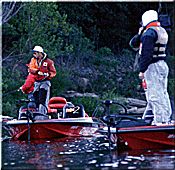
"You've got to bet big to win big," Walker says. "But you can lose big, too."
Walker's simple words sum up the life of the professional angler. Most anglers starting on the professional level hope their sponsors will fund their way. But that isn't usually the case.
"When you are fishing like that (professionally), you have got to win to get back what you put into it," Walker says. "There are not very many guys who have sponsors that pay that much. Tournament checks are important."
Both Walker and Bolton strategically planned their rise to the professional level. They spent several years refining their skills and saving money by competing on the Red Man circuit. Bolton also said the circuit allowed him to fish different waters and face intense competition.
"The biggest thing for me fishing the Red Man was learning," he says. "There was a great level of competition."
Bolton says the better your competition, the better tournament angler you become. You learn about the water, the tactics, and what it takes to win. And when you believe in yourself, and your skill level reaches its peak, then you know it is time to move up to a higher level of competition.
Walker says a pro-am trail is also a learning tool for anglers in ways other than fishing. "It is one of the best circuits to get you used to travel, staying in hotels, and pre-fishing the day before the tournament," he says. "It also will show you what will happen when you're away from home for several days. There you find out how things will work out."
A supportive family is a crucial element for tournament success. You and your family must understand what it is like to be gone for weeks. Many family members, children especially, can't understand long absences. Without family support, life on the professional circuit is difficult.
Bolton said that successful anglers also can make friends. For him, the key to success was the formation of strong friendships with other anglers. Angling friendships also help some of the nation's best anglers stay on top.
"I try not to be hardheaded, but sometimes I can be," Bolton said. "I'm fortunate to have a terrific bunch of guys to work with. They set me straight. That helps me a lot."
Bolton says most anglers openly share information. They also sound off to each other about ideas, tactics, and other things that might help improve their bass-catching abilities.
Longevity on the professional trail often is short. Anglers come and go depending on success and money. Walker says the key to prolonging one's life on the trail is to learn how to deal with people outside of your immediate friendships. Those are the skills sponsors look for.
"The stuff outside of fishing is important. You must be able to speak in public and watch how you look," he says. "As long as you keep winning, you get the attention. But the sponsors will go away if you stop winning and you don't have those other skills."
Review your situation this summer when you start to daydream about the professional tour. Are you a top-ranked angler in your division or state? Are you financially secure? Is your family supportive? Can you deal with other people? And do you have the confidence and desire to compete?
If you answered "yes" to ALL the above questions, it might be time to consider moving up to the next tournament level.
Content provided by Bass Fishing Magazine, the official publication of FLW Outdoors

